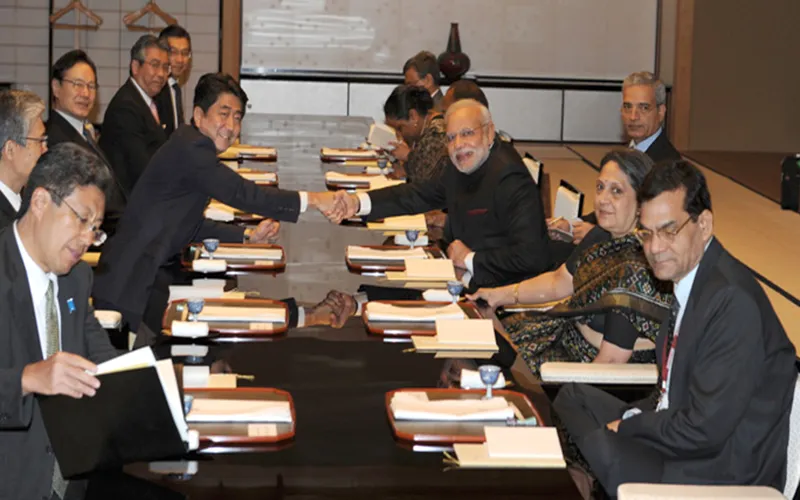Prime Minister Narendra Modi's trip to Japan has become a historic event in cementing the relations between India and Japan.
It was India's first Prime Minister, Jawaharlal Nehru, who visited Japan in the aftermath of its defeat in the World War II. Nehru took up the cause of Japan and advised the victorious nations and other countries not to treat Japan as a defeated country but extend all help and recognition due to Asian countries like Japan.
For Japan and its rulers, Modi was welcome since he had visited Tokyo twice during his 15-year-long chief ministership of Gujarat. More than any other state, Gujarat contributed maximum investment in Japan during the past 10 years and Modi had also invited Japanese investment in Gujarat by offering maximum concessions. For his part, the Japanese Prime Minister Shinzo Abe was more than responsive in extending substantial co-operation.
Modi commenced his Japan visit by arriving in Kyoto, Japan's ancient capital. Japanese Prime Minister received Modi there. During his visit to Kyoto, Modi said that he was inaugurating sister-city partnership between Kyoto and Varanasi which, he hoped, would begin the larger project of hundred smart cities in India, one of his prime projects.At a more important level, the Japanese PM Abe announced the intention to invest 3.5 trillion yen (Rs 2.1 lakh crore) in India over the next five years. This sum represented both public and private investments in India during the next five years. The Japanese funds would be invested in development of infrastructure in India. Specifically, the funds would be invested in building smart cities and in building and operating the bullet trains and freight corridors across the length and width of India. Modi's pet project of having a bullet train between Ahmedabad and Mumbai would be one of the first projects to fructify.
Though there was no nuclear deal which India hoped to get Japan to sign, officers of both sides had been asked by Modi and Abe to come up with a more workable and acceptable agreement which could be taken up later.
Addressing the joint meeting of Japanese and Indian industrial leaders in Tokyo, PM Modi said the Japanese industrialists were welcome to set up industries in India. Modi said there would be no red tape problem in getting clearances since a single window would be set up in his own office for expediting clearances.In a major development, which is of great significance to global strategy, Modi and Abe signed a Tokyo Declaration and Memorandum of Co-operation and Exchanges in defence which dealt with maritime exercises and continued participation in Indo-US Malabar exercises.
Modi also said during his visit that some countries entertaining expansionist ideas by encroaching upon others territories and entering the seas. These references were interpreted as reference to China since it had its spats with Japan over the Senkaku Islands. These remarks drew critical replies from the Chinese quarters. Not only did they blame Japanese PM Abe accusing him of priming Prime Minister Modi into making anti-China utterances. A government-backed thinktank in Beijing said the utterances of Abe and Modi in Tokyo might jeopardise the forthcoming visit of Chinese President Xi Jinping to India later in September. However, the Chinese media, such as the newspaper Global Times had said that the China-India relationship was a more important issue and whatever remarks Modi had made in Tokyo were a media hype, since Modi knew the great importance of co-operation between India and China.
All the same, deliberations of Modi and Abe in Tokyo would go a long way in building the bi-lateral synergies of the two countries, which would be of great importance in facing Chinese expansionist and economic dominance in the coming years. However, during the forthcoming visit of Chinese President Xi Jinping, Modi will explain India's resolve to utilise the full potential of India's strategy and co-operative partnership with India. Modi would also explain his keenness to settle border disputes with China.The larger theme of Narendra Modi is that India, Japan and China have many common interests and that all of them have to build on them and thereby initiate the Asian Century by working together and make the Asian Century a truly peaceful and prosperous one.
Narendra Modi's visit to Japan indeed turned out to be the inauguration of the beginning of the Asian Century in which Japan, China and India would contribute their best and make the Asian Century a success story.
(The writer is a former Governor and ex chief of the Intelligence Bureau)
Courtesy: The Tribune, September 8, 2014
The views expressed above belong to the author(s). ORF research and analyses now available on Telegram! Click here to access our curated content — blogs, longforms and interviews.
